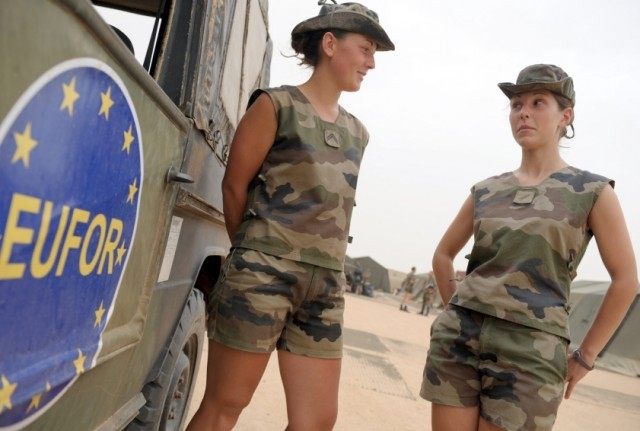A European Commissioner has revealed EU foreign ministers have discussed the role of the political bloc as peacekeepers in the Middle East.
In an interview with An Nahar, Christos Stylianides said the role of European peacekeepers in the United Nations Interim Force in Lebanon (UNIFIL) would be on the agenda at the key Brussels meeting this week.
There are concerns amongst eurosceptics that Brussels is looking to use Lebanon as a trial run for its EU army of ‘peace keepers’, stationing a group of soldiers in the south of the country.
An EU military force has been a dream for europhiles for decades, yearning to give the EU more clout by having an armed back up to its political and economic policies. And following the latest battle between Israel and Hezbollah, the senior EU figure spoke of a new ‘presence’ on the Lebanese side.
While it has a Common Foreign and Security Policy, the EU has made little advancement in a Single European military force, mainly because of the huge opposition it would have amongst the population of member countries and the very different approach those countries take in their foreign policy.
Its catalogue of intervention so far includes minimal success in Chad and Mali, countries where Brussels virtual had a single ‘multilateral’ relationship with incumbent governments.
With Washington producing different policies towards the region on an alarmingly frequent basis the EU is now looking at stepping into the potential void by placing its armies in the South of Lebanon and claim responsibility for keeping Israel and Hezbollah from attacking each other.
It’s a huge risk for Lebanon, but a great opportunity for europhiles desperate for Brussels to wield military power. Lebanon has problems with the refugee crisis because of the war in neighbouring Syria, with desperate thousands fleeing the barbaric terror of the Islamic State. It has been seeking international help to deal with the situation, giving the EU a diplomatic talking point with the country’s governments and the European Commission announced on Saturday that the EU is providing 37 million euros ($42 million) to help Lebanon cope with the refugees.
Mr Stylianides said this was the most demanding humanitarian crisis for Europe since World War II. “Those 12 million people are the victim of misery and are very close to the European border,” he said.
It’s not a new idea for the EU: they have wanted a peacekeeping force with its own autonomous policy alongside NATO in Afghanistan, for example, which was discussed in 2008 but never got off the ground.
And it’s an unusually good opportunity for Israel who for years have had a difficult relationship with the EU, until the arrival of new Italian Foreign Affairs Chief Federica Mogherini who has just scrapped all plans to sanction Netenyahu’s government for land grab. The price of risking the wrath of the traditionally pro-Palestine European Parliament and Commission could be those blue badged EU soldiers in the south of Lebanon.
The European Commissioner for humanitarian aid and crisis management told the website, “We have a common enemy which is terrorism,” adding that the presence of European troops in southern Lebanon would be discussed during a meeting in Brussels.
“It is beneficial to have deeper cooperation in that regard,” he said. “Terrorist attacks are not against a certain religion or civilization. We have a common enemy and people are assaulting our joint legacy,” he added.
The violence erupted when Hezbollah fighters attacked an Israeli military convoy in the Shebaa Farms area, killing two soldiers and wounding seven. Israel responded with shelling.

COMMENTS
Please let us know if you're having issues with commenting.